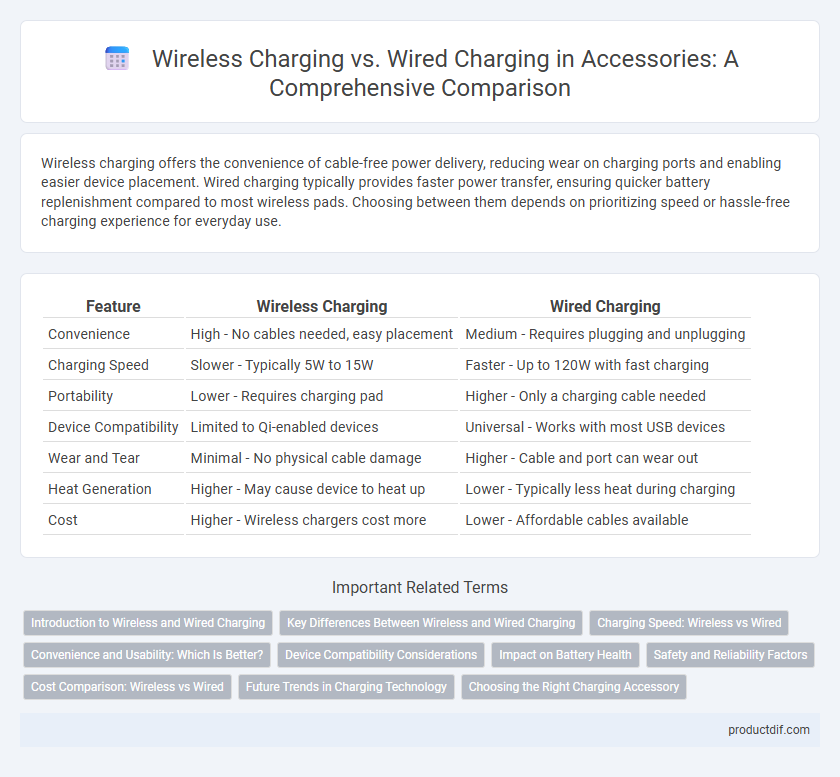Wireless charging offers the convenience of cable-free power delivery, reducing wear on charging ports and enabling easier device placement. Wired charging typically provides faster power transfer, ensuring quicker battery replenishment compared to most wireless pads. Choosing between them depends on prioritizing speed or hassle-free charging experience for everyday use.
Table of Comparison
| Feature | Wireless Charging | Wired Charging |
|---|---|---|
| Convenience | High - No cables needed, easy placement | Medium - Requires plugging and unplugging |
| Charging Speed | Slower - Typically 5W to 15W | Faster - Up to 120W with fast charging |
| Portability | Lower - Requires charging pad | Higher - Only a charging cable needed |
| Device Compatibility | Limited to Qi-enabled devices | Universal - Works with most USB devices |
| Wear and Tear | Minimal - No physical cable damage | Higher - Cable and port can wear out |
| Heat Generation | Higher - May cause device to heat up | Lower - Typically less heat during charging |
| Cost | Higher - Wireless chargers cost more | Lower - Affordable cables available |
Introduction to Wireless and Wired Charging
Wireless charging uses electromagnetic fields to transfer energy between a charging pad and a device, eliminating the need for physical cables. Wired charging relies on direct electrical connections through cables, offering faster power delivery and higher efficiency. Both methods support various devices, but wireless charging emphasizes convenience and reduced wear on ports.
Key Differences Between Wireless and Wired Charging
Wireless charging eliminates cables by using electromagnetic fields to transfer energy, offering convenience and less wear on device ports, while wired charging delivers power directly through a physical connection, enabling faster and more efficient energy transfer. Wireless charging typically supports lower wattage, resulting in slower charging speeds compared to wired solutions that can reach up to 100W or more, especially with USB Power Delivery standards. Compatibility varies as wireless chargers require Qi-enabled devices, whereas wired chargers depend on appropriate cable types such as USB-C or Lightning.
Charging Speed: Wireless vs Wired
Wired charging typically offers faster charging speeds compared to wireless charging due to direct power transmission and higher wattage capabilities, often reaching up to 30W or more with technologies like USB Power Delivery. Wireless charging speeds generally range from 5W to 15W, depending on the device and charger compatibility, leading to longer charging times. The efficiency of wireless charging is also influenced by the alignment and distance between the charger and device, which can further impact overall charging speed.
Convenience and Usability: Which Is Better?
Wireless charging offers unmatched convenience by eliminating cables, allowing users to simply place their device on a charging pad for effortless power replenishment, ideal for multitasking environments. Wired charging, though less flexible, typically provides faster and more reliable power delivery, which is crucial for users needing quick and consistent battery boosts. For everyday usability, wireless charging excels in convenience and ease of use, while wired charging's superior speed and stability benefit heavy device users and power-intensive scenarios.
Device Compatibility Considerations
Wireless charging offers broad compatibility with devices supporting the Qi standard, including many modern smartphones, earbuds, and smartwatches, enabling convenient cable-free power delivery. Wired charging supports a wider range of devices, from smartphones and tablets to laptops and gaming consoles, utilizing various connectors like USB-C, Lightning, and Micro-USB for faster charging speeds. Device compatibility considerations should prioritize the charging method aligned with the device's supported protocols and power requirements to ensure optimal performance and convenience.
Impact on Battery Health
Wireless charging generates more heat compared to wired charging, which can accelerate battery degradation and reduce overall battery lifespan. Wired charging delivers a more stable current with less thermal stress, helping maintain battery health over time. Choosing wired charging methods is generally recommended to preserve long-term battery performance.
Safety and Reliability Factors
Wireless charging reduces risks associated with exposed cables, minimizing hazards like electric shocks and wear-induced malfunctions, thereby offering enhanced safety. Wired charging provides a stable, consistent power transfer with less susceptibility to interference, ensuring reliable device performance. Safety certifications and proper usage guidelines for both methods further contribute to secure and dependable charging experiences.
Cost Comparison: Wireless vs Wired
Wireless charging accessories typically cost 20-50% more than wired chargers due to the advanced technology and convenience they offer. Wired charging solutions remain more budget-friendly, often priced between $10-$30, while wireless chargers generally start at $25 and can exceed $60 depending on brand and features. The higher upfront investment in wireless charging may be offset by reduced wear on device ports and enhanced user experience.
Future Trends in Charging Technology
Wireless charging technology is rapidly advancing with the integration of fast-charging protocols, improved coil designs, and increased charging distances, promising greater convenience and efficiency for future devices. Innovations such as magnetic resonance and over-the-air charging aim to eliminate cables entirely, enhancing user mobility and reducing clutter. Continued development in energy transfer materials and smart charging systems is set to redefine the balance between wireless and wired charging in upcoming electronic accessories.
Choosing the Right Charging Accessory
Wireless charging offers convenience and reduces cable clutter, making it ideal for users prioritizing ease of use and portability. Wired charging delivers faster power transfer and higher compatibility with various devices, suitable for those needing quick and reliable charging. Selecting the right accessory depends on device compatibility, charging speed requirements, and user lifestyle preferences.
Wireless Charging vs Wired Charging Infographic

 productdif.com
productdif.com